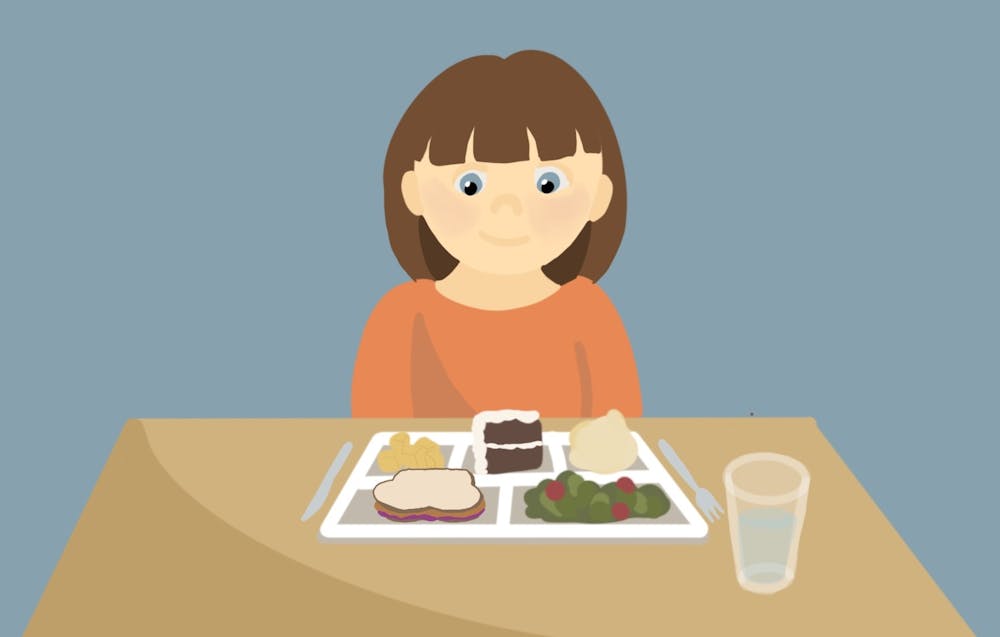Here’s a fact — all children get hungry. Here is another fact — all children in the U.S. are required by law to go to school. Put the two together and one would conclude that universally free school meals are a given. While other countries have moved past the primitive and petty actions of putting children in debt for a few dollars per milk carton and attempting to prohibit students from graduating over unpaid charges to the cafeteria, the greatest nation in the world has failed to do so. Even today, we are still asking which children are poor enough to deserve to eat a meal without any financial burden. This needs to change. Evidently, the need for food is universal, so one should not have to prove their eligibility to have access to it, especially in a school.
As students return to school, many of the more lenient regulations set forth by the pandemic have been lifted — including the waivers that allowed all students to eat free meals at school regardless of their income. These actions were implemented after the pandemic showed our nation’s true colors. Among everyone but the insanely rich, financial stability plummeted and income inequality — in which we are already the top nation — rose. Among the effects of the pandemic were severe food insecurity and heightened food prices, and the school lunch policy was one of various policies issued to try to combat the lack of affordable nutrition. If, as many Americans claim, our country was truly as financially and socially stable under the current welfare system that we have, this trend would not have emerged. The pandemic exposed America for what it was — hardly capable of keeping anyone alive and well, especially children.
However, as the COVID-19 vaccine emerged and the health policies around the virus began to dissolve, many government institutions drew back their policies, overlooking the fact that the pandemic was not the only cause of food insecurity and income inequality. The aforementioned waivers were not renewed for the 2022-2023 school year, and many children are returning without free lunch.
One of the justifications for this rollback is that children who were already eligible before the pandemic — low-income children — still qualify. This is simply not good enough, and it has never been. Even those who are not considered low-income or poverty-stricken have difficulty paying for school meals. First of all, students should not be in debt. It is unacceptable that children “owe” money to the school for lunch and may even be starved and shamed because of it. Of course, this debt transfers to their parents or guardians, but that in itself is also reprehensible. Whether one packs a lunch for their child or gives their children money for school lunch, household finances are being used to feed a child at a government institution as opposed to money being used for other necessities and bills.
Not only are there financial consequences for the children and their families, but there are also stigmas attached to free or reduced lunch — not only by individuals but also by the government. Reminiscent of the “welfare queen” trope that has dominated welfare reform since President Reagan, America has often thought of children who qualify for these programs as inferior and pitiful. This shame in itself is terrible, but even more so under a racial lens. Black, brown and indigenous children are more likely to go to schools in high-poverty areas than their white and Asian counterparts, and 40 percent of Black and Hispanic parents of school-age children are food insecure. Not only that, but school meal eligibility requirements stratify families. For instance, these rigid requirements mean that if a family finds itself no longer eligible to receive free or reduced meals, then they have to begin to pay for their children’s meals — they made it to a new economic rank only to have a new bill to pay.
Additionally, the hoops that “eligible” children and their families must jump through to receive free or reduced lunch are tedious, stratifying and arbitrary, varying by state. If a household misses the application for these school meal programs, what then? Why do we assess how poor or rich a child is before they deserve to eat? There should be no process to justify free school meals at school, a place which children are required to go to every week — much less an arbitrary date past which children are deemed no longer deserving. Many school lunches are not only the relatively healthiest meals for children, but for some, they are the only meals a child receives. To put a price and deadline on these resources for every student and allow some to pay and others not to pay is to ask the question, “which of these kids deserves help with getting food?”
Universal free school meals for all children in the country is not impossible — it’s not some pipe dream. It’s been proven to be doable, manageable and quite frankly, more holistic than anything the U.S. has ever come up with in terms of school meals. While many states are continuing to provide free meals for students, this should not be considered a zipcode luxury — people deserve food because they are human beings. The argument is only emphasized for children, and they don’t owe you anything.
Shaleah Tolliver is the Senior Associate Opinion Editor for The Cavalier Daily. She can be reached at opinion@cavalierdaily.com.
The opinions expressed in this column are not necessarily those of The Cavalier Daily. Columns represent the views of the authors alone.







